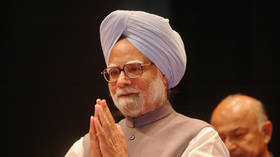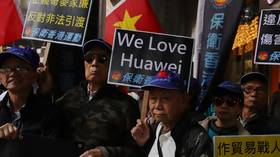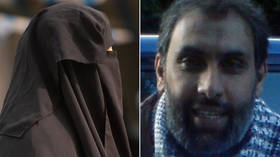US Supreme Court declares inmates have no constitutional right to ‘painless death’

The Supreme Court has declared prisoners have no constitutional right to a “painless death,” allowing the execution of a convicted murderer to go forward despite his protestations that lethal injection would cause him to suffer.
Reversing a 2018 decision, the court ruled that death-row prisoner Russell Bucklew’s constitutional protections from “cruel and unusual punishment” did not exempt him from pain and that he’d failed to present sufficient evidence that his preferred method of execution, the gas chamber, was less painful or that it could be “readily implemented.”
“The Eighth Amendment does not guarantee a prisoner a painless death,” Justice Neil Gorsuch wrote in the court’s majority opinion, “something that, of course, isn’t guaranteed to many people, including most victims of capital crimes.” The court was split along party lines, with five conservatives backing the ruling and four liberals dissenting.
Bucklew sat on death row for 23 years filing one appeal after another, a fact Gorsuch mentioned in his opinion, which referenced the convicted killer “secur[ing] delay through lawsuit after lawsuit.” His latest appeal did not contest his guilt or even seek to avoid execution, but sought a stay over the constitutionality of execution by lethal injection of pentobarbital – which Bucklew’s lawyer argued would rupture tumors in the man’s face, neck, throat, and head caused by cavernous hemangioma, a rare medical condition, and therefore constitute cruel and unusual punishment under the Eighth Amendment.
Gorsuch and the other conservative justices were unduly “dismissive” in assuming Bucklew’s appeals were meant as a delaying tactic, Justice Sonia Sotomayor wrote in her dissenting opinion. While the court stayed his execution in 2018, two justices have retired since then and been replaced with Trump appointees Gorsuch and Brett Kavanaugh.
Bucklew was convicted of shooting and killing Michael Sanders, the live-in boyfriend of Bucklew’s ex-girlfriend Stephanie Ray, kidnapping and raping Ray, shooting at Sanders’ young son, and wounding a police officer - in 1996. By 2008, he had exhausted his appeals, as well as federal and state habeas corpus challenges. Since then, repeated lawsuits have kept him out of the execution chamber.
Reactions to the Supreme Court’s decision were sharply divided, with many viewing the decision - and capital punishment itself – as barbarous,
America is still in the Dark Ages when it comes to the death penalty. Abolish it already! Jesus!
— Paul (@HeathenOnEarth_) April 1, 2019
This is horrifying!We are a morally lost and corrupt nation!Invoking capitol punishment leads to serious problem- Executioners + staff live with trauma and guilt- Practicalities - industry and greater expense for killing- Innocents are inevitably killed#NoDeathPenalty
— Mort au Fascisme (@URMort) April 1, 2019
Dark dark day, the Supreme Court condones torture. My poor country.
— Sister Unity (@SisterUnity) April 1, 2019
or a poorly-disguised attempt at revenge.
Cruel and unusual punishment.Putting aside the fact that the death penalty does not work, there are a lot of actually painless methods for execution. But of course that isn't what the legal system wants. They want revenge. And they will torture to get it. https://t.co/hm14cOqyRu
— Cuddle Cryptid 🇺🇸 (@CuddleCryptid) April 1, 2019
Why are we still embracing capital punishment? It casts justice as revenge, under cover of a misuse of the word "closure."What of the prosecutorial misconduct, and the millions paid for wrongful imprisonment and death penalty executions?Unaffordable. https://t.co/8YSrIdiOfm
— Brad Morrison (@bradmoreso) April 1, 2019
We have already seen the death penalty does not deter violent crime, and we have seen many ppl on death row found to be innocent. I don't want my government to be cruel like this. This shouldn't be about revenge and inflicting pain on someone, U don't even recognize America jfc
— Sensia (@Sensiablue) April 1, 2019
Others considered the 23-year delay - during which Bucklew was fed and housed on the taxpayer’s dime - as absurd.
A 5-4 decision... only carried by conservatives? This murderer has been avoiding execution by using the appeal processes for over 20 years? WTH is wrong with these democrat appointed justices? Do you think this murderer gave his victim a 'painless'... https://t.co/JFiCchEHhN
— Mike Jones (@elknc) April 1, 2019
If it were up to Sin Sick Liberals & Humanists; there wouldn’t be a Death Penalty & just release these violent murderers back into society after a short spell in a comfy prison with all the food & Healthcare they want or kill them with a sleeping pill.🙏🏾 https://t.co/5vkaRBi2U3
— Ramón E. Balaguer T. (@RamonEBT) April 1, 2019
How about him getting raped and beaten then? Would that be more constitutional? Because that’s what he did to one of his victims when he violated her body and her constitutional rights. I say an eye for an eye. Don’t @ me
— Flattery Operated 🇺🇸🇮🇹🌹🙏🏼 (@Vitale_IVplay) April 1, 2019
And it wouldn’t be Twitter if people didn’t hijack the news for their own ideological crusades.
Capital Pun is only used in dire circumstances: 25 executions last yr vs 13000 late-term abortions. To argue abortion is painless but LI isn't is a hell of a stretch. You can't confirm that, and it's a bad argument, particularly w/ late-term.
— Matthew Hansen (@Matty_FoCo) April 2, 2019
Funny how assisted suicide, we are told, is peaceful and dignified. Something doesn't compute. https://t.co/uvNLI0DTYy
— Wesley J. Smith (@forcedexit) April 2, 2019
Trump should remember this when his time comes. His will be the most bigly execution ever. He is the biggest traitor ever with apologies to Benedict Arnold, and Mitch McConnell https://t.co/44J4U5cOuT
— Hope Vinitsky (@hopevee) April 1, 2019
Think your friends would be interested? Share this story!














